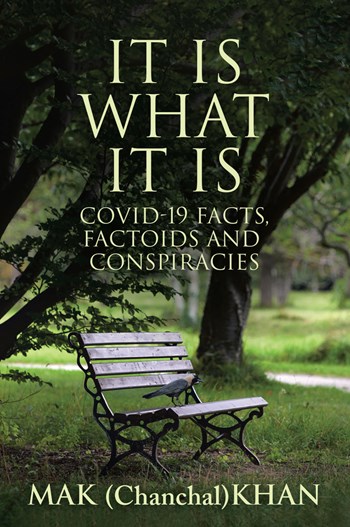Mak Khan’s IT IS WHAT IT IS (COVID-19 Facts, Factoids and Conspiracies) represents an attempt to deal with the facts around Coronavirus and the way it is portrayed in public, with an eye, in particular, on conspiracy theories and other media missteps. Opening with an explanation of the early days of the virus and spreading to incorporate scientific studies and the way media and social media have altered perceptions of the spread of Covid in recent months (the book was published on September 8th, 2021), it touches on the key points: the scientific takes and evidence, but also the insistence that all is not what it seems, from conspiracies around the idea of lab manufacture, to the impact of Donald Trump’s early response. Some of the details covered are stark and scary: apparently there are people out there that believe that there are worms in surgical masks that are activated by human breathing, for example, as well as the more commonly held conspiracy-angles. Shining a light on why these far-fetched beliefs are held is certainly an interesting exercise.
In order to make such analysis, the book goes into concepts like logic and reason, and human frailty when it comes to assessing the value of data and the best course of action. Issues like a human tendency to conflate correlation and causation, and to oversimplify processes – rational failing, essentially – are gone over in comprehensive detail, with extra time spent on financial vested interests in their tendency to intentionally mislead. Naturally this information is valuable, but it doesn’t come without the author’s own biases creeping through at certain points, in attributing his own beliefs to logic at several points without really explaining why: in some cases, they look more like hindsight, a flaw in a book that leans heavily, almost to the point of academically, on logic as a concept. Khan somewhat oversteps the bounds of definitive fact, for example, in assertions like a claim the war on Saddam Hussein’s Iraq was valid solely because of Hussein’s political philosophy (very much a matter of opinion), and that Coronavirus wouldn’t have spread with better funding to overseas pandemic response (again, far from proven), amongst others. As an opinion, these assertions are fair enough, but unexplained in a book so staunchly embedded in logic, they sit poorly. That said, these occurrences are largely peripheral and the key analysis seems heavily grounded in research and strikes as its strongest asset. At the time of reviewing, the text is extremely up-to-date, and is couched in the kind of academic language that purposefully steps away from anything controversial, instead presenting evidence and reasoning behind it. Of course, IT IS WHAT IT IS faces the same issues that any other writing seeking to address Covid conspiracies will face: for anyone who firmly believes an opposing narrative, for all its varied scientific research and measured tone, this text will likely be seen as simply another contribution to the conspiracy they already insist upon. In the sense of changing minds, then, it’s perhaps unlikely to impact those who aren’t already wavering. For everyone else, there’s a lot of firm logic here grounded in the research and, perhaps more importantly, the writing of those who have really done their research, and not on YouTube or Facebook. In short, it’s a strong primer on the situations we’ve faced.
An attempt to deal with Covid conspiracies and the impact the virus has had on our politics and media in a factual way, Mak (Chanchal) Khan’s IT IS WHAT IT IS contains plenty of astute observations and a lot of factual based reporting.
~James Hendicott for IndieReader

